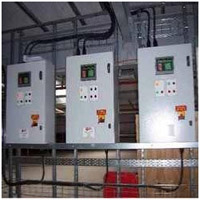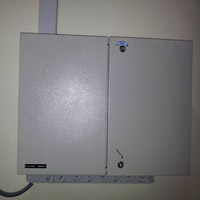BMS System
- » A Building Management System (BMS) is a computer-based control system installed in buildings that controls and monitors the buildings mechanical and electrical equipment such as ventilation, lighting, power systems, fire systems, and security systems. A BMS consists of software and hardware; the software program, usually configured in a hierarchical manner, can be proprietary, using such protocols as C-bus, Profibus, and so on. Vendors are also producing BMSs that integrate using Internet protocols and open standards such as DeviceNet, SOAP, XML, BACnet, LonWorks and Modbus.
- Building tenant/occupants: » Good control of internal comfort conditions » Possibility of individual room control » Increased staff productivity » Effective monitoring and targeting of energy consumption » Improved plant reliability and life » Effective response to HVAC-related complaints » Save time and money during the maintenance
- Building owner: » Higher rental value » Flexibility on change of building use » Individual tenant billing for services facilities manager » Central or remote control and monitoring of building » Increased level of comfort and time saving » Remote Monitoring of the plants (such as AHU's, Fire pumps, plumbing pumps, Electrical supply, STP, WTP etc.)
- Honeywell Building Solutions » Each building is unique in terms of construction, utilities / facilities provided usage and people. Due to large number of diverse technologies that exist in any building, managing them effectively and efficiently is a challenge. Hence, building / facility managers all over insist on a sophisticated Building Management System that helps them do this. A well-designed Building Management System ensures smooth operations of the building as well as makes it energy efficient.
Benefits of BMS:
.png)

